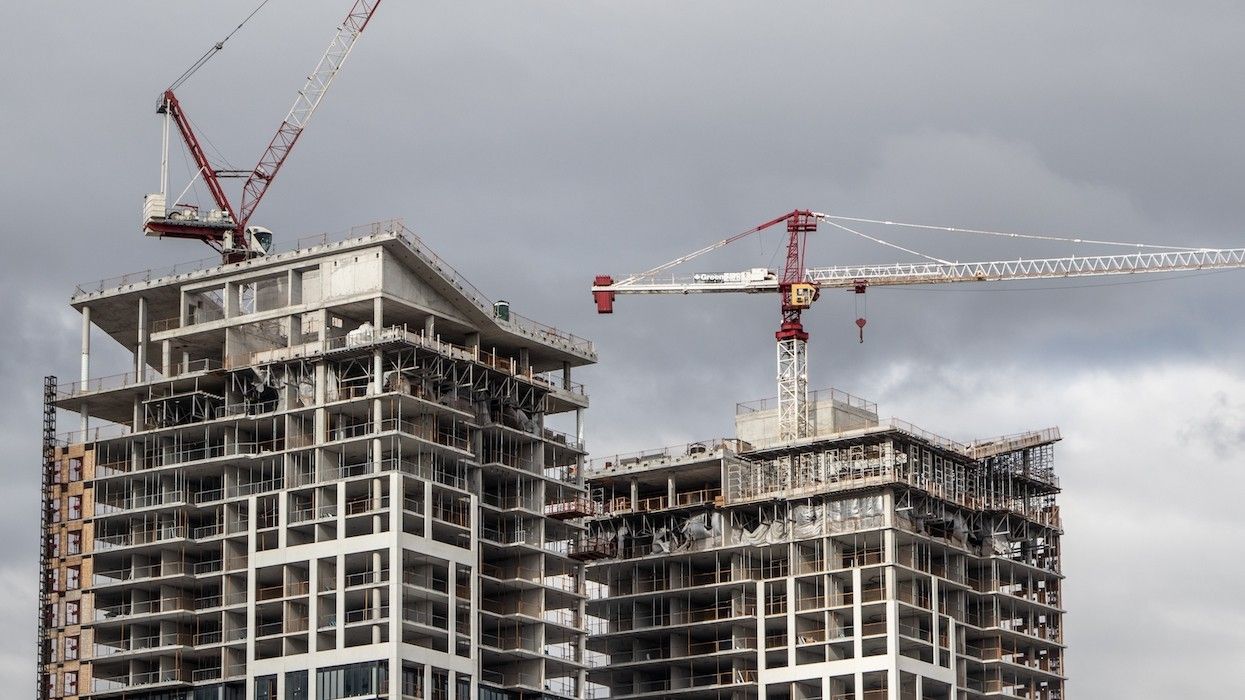We may now be three interest rate cuts in (with a fourth anticipated for next week), but rates have already left an indelible mark on the Greater Toronto and Hamilton Area’s new condominium market. In fact, over the past two years, 33 new condo projects that were actively selling have been converted to rental, put on hold, cancelled, or placed under receivership, according to a new report from Urbanation.
Had those projects been brought to market as originally planned, a total of 6,796 condo units would have been added to the market.
In the third quarter alone, three condo projects totalling 1,111 units that were previously launched for pre-sale were converted to purpose-built rental, the report further notes, while eight projects totalling 2,231 units were either put on hold, cancelled, or placed into receivership.
This is the first time that Urbanation has broken down the data in this way, and with mention of units being converted into rental. Previous versions of the report have only indicated the number of projects that were on track to launch and had been ‘put on hold indefinitely’ since 2022.
Coming back to the third-quarter data, Urbanation reveals that new condo sales across the GTHA were remarkably slow between July and September, with just 567 transactions recorded. That figure is down 81% annually, 87% below the 10-year average for Q3 periods, and represents “the lowest quarterly total since Q1-1995,” the report says.
There was a bit of nuance when assessing unsold new condo inventory in the quarter. On one hand, unsold units in development fell 4.4% quarter over quarter from 25,018 units in Q2 (a record high) to 23,918 units in Q3. Though this was the largest quarterly decline recorded in two-and-a-half years, it was “mainly” attributed to the fact that just one project with 177 units was brought to market in the quarter. Meanwhile, unsold new condo inventory ended the third quarter 16% above its year-ago level and 56% above the latest 10-year average.
As of the third quarter, unsold inventory consisted of 11,629 units in pre-construction projects, 11,356 units in under-construction projects, and 933 units in completed projects, according to the report. It also points out that “a 76% share of unsold inventory was in projects that required purchaser deposits of at least 20%,” and warns that “the new mortgage rules will likely have a limited direct impact on new condos, since most buyers were already able to access 30-year amortizations.”
Unsurprisingly, there were very few new condo projects that begun construction in the third quarter, with just 2,163 starts recorded. That number is down 13% annually and marks the slowest Q3 period for starts in over a decade. Representing more than a three-year low, there were 88,967 new condos under construction across the GTHA in the third quarter.
On the price side of things, unsold new condo prices averaged $1,349 per sq. ft in the third quarter, and that price-point is down 2.4% year over year, according to Friday’s report. Prices have come down by 5.6% since hitting a high of $1,429 psf in Q3-2022.
Urbanation President Shaun Hildebrand underscores that the GTHA’s new condo market is in the midst of its “toughest challenge” in decades. “Investors are inactive and end-user buyers currently have plenty of lower-priced options to choose from in the resale market,” he adds. “It may take a while, but conditions will gradually improve as developers hold back supply, construction inventory continues to drop, and demand rises with declining interest rates.”
Looking ahead, Urbanation is forecasting that condo completions will reach a total of 24,386 units by the end of 2024, “slightly edging out” last year’s total of 24,114 completions (a record high). In 2025, completions are projected to reach 29,409 units, before dropping off in the following years.
It’s worth noting that what Urbanation is projecting is in line with what many real estate sector stakeholders are fearful of: that sluggishness in the new condo sector right now will ultimately cause completions to “fall off a cliff” by 2027 and 2028. While high interest rates have not done condo developers any favours these past few years, experts also point to astronomical development charges and a seeming unwillingness amongst levels of government to step in and bring the mammoth costs associated with building down.
In addition to losing out on potential housing, there is anticipated to be other fallout if this “cliff” comes to fruition, including rampant sales price and rent growth, as well as a significant damper on job growth and Ontario's broader economy.
- ‘There’s Going To Be A Crisis’: New Condo Construction Is Heading Toward A Cliff ›
- “Lost Confidence”: Mizrahi’s Yorkville Condo Project In Receivership As Partner Alleges $47M Debt ›
- 60 GTHA Condo Projects On Hold Indefinitely As Developers Pull Back "Dramatically" ›
- Over 22,000 New Condo Units Are Going Unsold In The GTA — A “Record High” ›
- GTA Condo Supply Approaching A Number “The Market Has Never Seen” ›
- 2,800 GTHA Condo Units Cancelled In 2024 — The Most Since 2020 ›





















